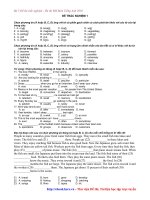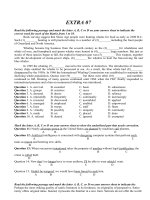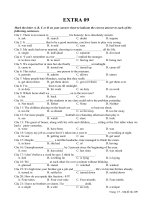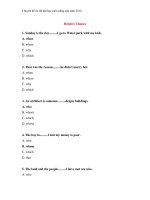Ôn thi Đại học môn tiếng Anh: Đề kiểm tra tiếng anh 45 câu trắc nghiệm (có đáp án)
Bạn đang xem bản rút gọn của tài liệu. Xem và tải ngay bản đầy đủ của tài liệu tại đây (163.95 KB, 6 trang )
BÀI TẬP VỀ NHÀ BUỔI HỌC 12/1/2016
1. ________ hard, and you will pass the final exam.
A. Working
B. If you work
C. Work
D. To work
2. According a recent survey, if the factory closes, a lot of people _______ their jobs.
A. are going to lose
B. will lose
C. may lose
D. are about to lose
3. Whenever I was in trouble, he would do what he could ________ me.
A. help
B. helping
C. to help
D. helped
4. To save money,____________.
A. every means must be tried
B. it’s important not to buy expensive things
C. not to waste money matters a lot
D. we decided to take his advice
5. ___________ that I want to eat another two.
A. Such delicious cakes are they
B. So delicious they are cakes
C. Such delicious cakes they are
D. So delicious cakes they are
6. Was it in the science museum _______ you visited yesterday _______ you left your keys?
A. that; where
B. that;/
C. /; that
D. where; that
7. --- Did Peter come back early last night?
--- Yes. It was not yet eight o’clock _________ he arrived home.
A. when
B. that
C. until
D. before
8. I was just going to cut my rose bushes but someone _______ it. Was it you?
A. has done
B. had done
C. would do
D. was doing
9. Every one of us hoped that he would ________ after the operation.
A. pick up
B. take up
C. break up
D. split up
10. ---I think smoking should be completely banned in public and at home.
--- ________
It’s impossible.
A. I couldn’t agree more.
B. I totally agree with you.
C. How come?
D. You can’t be serious.
I was fifteen months old, a happy kid until the day I fell. It was a
11
fall. I landed on a
glass rabbit which cut my eye badly enough to make it blind. Trying to save the eye, the doctors
stitched the eyeball together where it was
12
1
, leaving a big ugly scar in the middle of my
eye. The attempt
13
, but my mother, in all of her wisdom, found another doctor who knew
that if the eye were removed
14
, my face would grow up badly distorted,
15
my
scarred, sightless, cloudy and gray eye lived on with me. As I grew, this sightless eye in so many
ways
16
me.
I walked with my face looking at the
17
so that people would not see the
18
me. Yet my mother would say to me, at every turn, “Hold your head up high and
19
world. If you hold your head up high, it will be OK, and people will see your
soul.” She
continued this
21
20
the
whenever I was trying to hide.
Mama’s words were of great help for me to face the world
22
. As a teenager, even
though I tended to look down to hide my shame, I found that sometimes when I held my head up
high and let people know me, they
23
academically and socially. I was
elected class president. My mother’s words helped me
25
me. In high school, I was
begin to realize that by letting people look at my face, I let them
beauty behind both eyes, even if they couldn’t see it on the
27
26
24
both
the intelligence and
.
Now I’m a happy wife and great mother. The message “Hold your head up high,” has been
28
many times in my
29
home. Each of my children has felt
30
the gift my mother gave me has lived on in another generation.
11. A. surprising
B. sudden
C. big
D. bad
12. A. separated
B. destroyed
C. cut
D. hurt
13. A. failed
B. tried
C. succeeded
D. managed
14. A. quickly
B. entirely
C. carefully
D. slowly
15. A. then
B. if
C. still
D. so
16. A. protected
B. affected
C. stopped
D. interrupted
17. A. floor
B. world
C. front
D. people
18. A. shy
B. eldly
C. ugly
D. strange
19. A. deal with
B. see
C. laugh at
D. face
20. A. different
B. beautiful
C. lonely
D. honest
21. A. sentence
B.passage
C.opinion
D.message
22. A. bravely
B. proudly
C. simply
D. fairly
23. A. disliked
B. liked
C. hated
D. noticed
2
invitation, and
24. A. comfortable
B. valuable
C. successful
D. special
25. A. nearly
B. even
C. hardly
D. still
26. A. touch
B. observe
C. watch
D. recognize
27. A. surface
B. outing
C. head
D. scar
28. A. discussed
B. heard
C. talked
D. written
29. A. brave
B. peaceful
C. sweet
D. exciting
30. A. their
B. my
C. its
D. her
Chinese writer Mo Yan has won the 2012 Nobel Prize in Literature, announced the Swedish
Academy in Stockholm on Thursday.The win makes Mo Yan the first Chinese citizen to win the
Nobel in its history.Informed of his win today, the author, who was having dinner at home, was
“overjoyed and scared".
Born in 1955 to parents who were farmers, Mo Yan-a pen name for Guan Moye,grew up in
Gaomi in Shandong province in eastern China. At the age of 12, he left school to work, first in
agriculture, later in a factory. In 1976 he joined the army and during this time began to study
literature and writing.
He published his first book in 1981, but found literary success in 1987 with Hong Gaoliang
Jiazu, which was successfully filmed in the same year, directed by a famous Chinese director Zhang
Yimou. In his writing, Mo Yan draws on his youthful experiences and on settings in the province of
his birth and his works show the life of Chinese people as well as the country's unique culture and
folk customs. Mo Yan is known as a prolific writer. In addition to his novels, he has published many
short stories and essays on various topics. Despite his social criticism, he is seen in his homeland as
one of the most famous contemporary authors. Dozens of his works have been translated into
English, French, Japanese and many other languages.
The awarding ceremony will be held on December 10.The winner will win a medal, a personal
diploma and a cash award of about $l million.
31.How did Mo Yan feel when he was told about the news?
A. Excited and proud.
B.
Happy and surprised.
C. Worried and cautious
D.
Uncertain and shocked.
32.Mo Yan developed his ability for writing when he was
3
.
A. on a farm
B. in a factory
C. in a school
33.One of Mo Yan's characteristics of writing is that he
A. writes about topics he is familiar with
C. describes his characters in a unique way
D. in the army
.
B. focuses on social problems in the country
D. explains difficult matters in simple words
34. Which of the statements is true?
A. Mo Yan published his first book when he was 20 years old.
B. The movie Hong Gaoliang was made in 1987.
C. Mo Yan only writes novels.
D. Mo Yan’s works are mostly about city life.
35. What's the best title for this passage?
A. How Mo Yan Gets Nobel Prize
B. An Introduction to Nobel Prize
C. Mo Yan Wins Nobel Prize in Literature
D. A World Famous Writer, Mo Yan
When I was six, Dad brought home a dog one day, who was called “Brownie”. My brothers
and I all loved Brownie and did different things with her. One of us would walk her, another would
feed her, then there were baths, playing catch and many other games. Brownie, in return. loved each
and every one of us. One thing that most touched my heart was that she would go to whoever was
sick and just be with them. We always felt better when she was around.
One day, as I was getting her food, she chewed up one of Dad’s shoes, which had to be thrown
away in the end. I knew Dad would be mad and I had to let her know what she did was wrong.
When I looked at her and said, “Bad girl,” she looked down at the ground and then went and hid. I
saw a tear in her eyes.
Brownie turned out to be more than just our family pet, she went everywhere with us. People
would stop and ask if they could pet her. Of course she’d let anyone pet her. She was just the most
lovable dog. There were many times when we’d be out walking and a small child would come over
and pull on her hair. she never barked or tried to get away. Funny thing is she would smile. This
frightened people because they thought she was showing her teeth. Far from the truth, she loved
everyone.
Now many years have passed since Brownie died of old age. I still miss days when she was
with us.
4
36. What would Brownie do when someone was ill in the family?
A. Look at them sadly.
B. Keep them company.
C. Play games with them.
D. Touch them gently.
37. We can infer from Paragraph 2 that Brownie________.
A. world eat anything when hungry
B. felt sorry for her mistake
C. loved playing hide-and-seek
D. disliked the author’s dad
38. Why does the author say that Brownie was more than just a family pet?
A. She was treated as a member of the family.
B. She played games with anyone she liked.
C. She was loved by everybody she met.
D. She went everywhere with the family.
39. Some people got frightened by Brownie when she________.
A. tried to be funny
B. barked
C. rushed to them
D. smiled
40. Which of the following best describes Brownie?
A. Caring
B. Polite
C. Brave
D. Shy
Rae Armantrout, who has been a poetry professor at the University of California San Diego
(UCSD) for two decades, has won the 2010 Pulitzer Prize in the poetry category for her most recent
book, "Versed".
"I'm delighted and amazed at how much media recognition that the Pulitzer brings, as
compared to even the National Book Critics Award, which I was also surprised and delighted to
win," said Armantrout.
"For a long time, my writing has been just below the media radar, and to have this kind of
attention, suddenly, with my 10th book, is really surprising."
Armantrout, a native Californian, received her bachelor's degree at UC Berkeley, where she
studied with noted poet Denise Levertov, and her master's in creative writing from San Francisco
State University. She is a founding member of Language Poets, a group in American poetry that
analyzes the way language is used and raises questions to make the reader think.
In March, she won the National Book Critics Circle Award for "Versed."
"This book has gotten more attention," Armantrout said, "but I don't feel as if it's better."
The first half of "Versed" focuses on the dark forces taking hold of the United States as it
fought the war against Iraq. The second half looks at the dark forces casting a shadow over her own
5
life after Armantrout was diagnosed with cancer in 2006.
Armantrout was shocked to learn she had won the Pulitzer but many of her colleagues were not.
"Rae Armantrout is a unique voice in American poetry," said Seth Lerer, head of Arts and
Humanities at UCSD.
"Versed", published by the Wesleyan University Press, did appear in a larger printing than her
earlier works, which is about 2,700 copies. The new edition is scheduled to appear in May.
41. According to Rae Armantrout, __________
A. her 10th book is much better
B. her winning the Pulitzer is unexpected
C. the media is surprised at her works
D. she likes being recognized by her readers
42. Which of the following is true of Rae Armantrout?
A. She published a poetry textbook.
B. She used to teach Denise Levertov.
C. She started a poets' group with others.
D. She taught creative writing at UC Berkeley.
43. What can we learn about "Versed"?
A. It partly concerns the poet's own life.
B. It is mainly about the American army.
C. It is a book published two decades ago.
D. It consists of three parts.
44. Rae Armantrout's colleagues think that she __________.
A. should write more
B. has a sweet voice
C. deserves the prize
D. is a strange professor
45. What can we learn from the text?
A. "Versed" has been awarded twice.
B. Cancer made Armantrout stop writing.
C. Armantrout got her degrees at UCSD.
D. About 2,700 copies of "Versed" will be printed.
11-15DCABC
16-20BACDB
31-35BDABC
6
1-5CBCDA
6-10CABAD
21-25DABCB
26-30DABCC
36-40BBCDA
41-45BCACA









